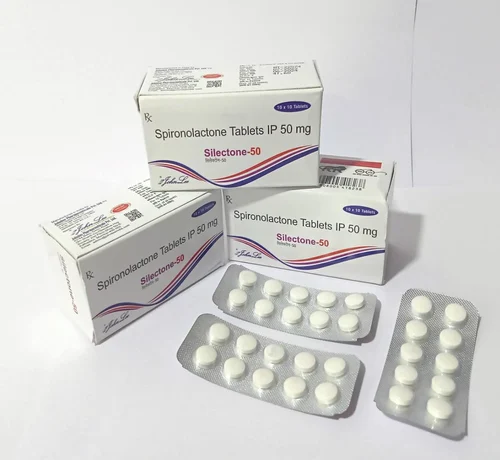✅ Generic Name:
Spironolactone 50 mg Tablet
📄 Description:
Spironolactone 50 mg is a potassium-sparing diuretic and aldosterone antagonist used in managing conditions involving fluid retention, hormonal imbalance, or elevated aldosterone levels. It works by blocking aldosterone at the renal distal tubules, promoting sodium and water excretion while retaining potassium.
🌿 Nature / Drug Class:
- Therapeutic Class: Diuretic, Antihypertensive
- Pharmacologic Class: Aldosterone antagonist, Potassium-sparing diuretic
- Mechanism of Action:
- Inhibits aldosterone → increases sodium excretion and potassium retention
- Mild diuretic effect with hormonal modulation
🎯 Purpose / Indications:
- Heart failure (especially with reduced ejection fraction)
- Hypertension, especially resistant cases
- Edema due to liver cirrhosis, nephrotic syndrome, or heart failure
- Primary hyperaldosteronism (Conn’s syndrome)
- Polycystic Ovary Syndrome (PCOS) (off-label)
- Hirsutism in women (off-label)
- Hypokalemia due to other diuretics
✅ Advantages:
- Prevents potassium loss
- Improves cardiovascular outcomes in heart failure
- Helps manage hormonal disorders like PCOS and hirsutism
- Useful for ascites and portal hypertension in cirrhotic patients
- Oral formulation for outpatient treatment
💊 Dosage & Administration:
- Usual dose range: 25–100 mg daily
- Starting dose for heart failure: 25–50 mg once daily
- Dose can be adjusted based on response and potassium levels
- Always administer with food to improve absorption
📦 Common Packaging:
- Tablets: 50 mg strength
- Packaging:
- Blister packs or strips, commonly 10 tablets per strip
- Often supplied in boxes of 30 or 100 tablets
❄️ Storage Conditions:
- Store at room temperature (15–30°C)
- Keep away from moisture, heat, and direct sunlight
- Store in original packaging to avoid degradation
👨⚕️ Patient Advice / Precautions:
- Take the tablet with meals
- Avoid potassium supplements or salt substitutes
- Monitor for signs of high potassium: muscle weakness, slow heartbeat, tingling
- Notify physician if you develop breast tenderness or irregular periods
- Requires regular blood tests for potassium and kidney function
- Caution when used with ACE inhibitors, ARBs, or NSAIDs

